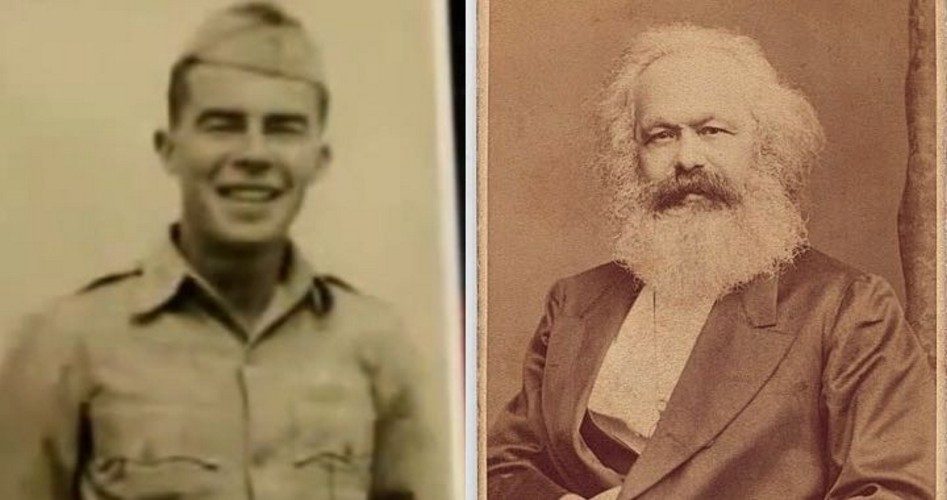
While born in the same month, one hundred years apart, John Birch and Karl Marx could not have been more different.
Both men were born in May, but it is more than the 100 years between their births that separates the differences between the two. One was born of parents who faced poverty, while the other was the child of a successful lawyer. One had a father and a mother who took their faith in God very seriously, while the other had a father who ditched the faith of his own fathers, and was rather indifferent about his adopted religion. One’s Christian faith led him to missionary work in China, while the other’s lack of faith led him to denounce belief in God. One despised atheistic communism, while the other’s name will forever be associated with that evil system that has taken the lives of more than 100 million human beings.
The first man was John Morrison Birch (shown on left), born May 28, 1918, while the second was Karl Marx (shown on right), born May 5, 1818.
Marx was hired by the shadowy group known as The League of the Just (composed of discontented socialist revolutionaries who desired to unite all socialist revolutionaries into the Communist Party they were forming) to write the platform of the Communist Party. While the communists claimed to champion the cause of the poor working class, Marx was born in Trier, in the German Confederation, of well-to-do parents.
Marx’s father, Heinrich Marx, enjoyed a lucrative legal practice, with an income that placed him in the top five percent of the city. While many parents today read Dr. Seuss, Bible stories, or fairy tales to their young children, Heinrich read aloud to young Karl such radical Enlightenment thinkers as Rousseau and Voltaire. Later, Marx went to college at the University of Berlin where he was introduced to even more radical philosophies.
He quickly became a devotee of the philosophy of Georg Wilhelm Hegel, and Marx would later make use of Hegelian “dialectics” in constructing his “Scientific Socialism” that we know as Marxism or communism. He also fell under the direct radical influence of a professor of legal history, Edward Gans, an advocate of the Saint Simonians, early French socialists.
Marx became a dedicated atheist at the university, partly through the influence of Bruno Bauer, a professor, who argued that Jesus’ life was based on pious forgeries. In fact, Bauer said Jesus never even existed.
Because of his vocal atheism, Marx was denied a teaching position in Germany after completing his doctorate, and turned to journalism, which eventually led to The League of the Just to hire him to write infamous Communist Manifesto. Together with his other writings, such as Das Kapital, Marx inspired many of the worst tyrants of history, such as Lenin and Stalin in the Soviet Union, Mao Tse-tung in China, and Pol Pot in Cambodia.
John Birch, on the other hand, never wrote a book, but he did write a short essay about four months before his death, called “The War Weary Farmer,” which summarized his philosophy of life. “I want of government only protection against the violence and injustices of evil or selfish men,” Birch wrote in April 1945. The essay is a short, but eloquent statement of opposition to collectivism.
Birch was in China, where he had gone as a Baptist missionary, to reach the people of that country for Christ. While there, he saved the lives of Lt. Col. Jimmy Doolittle and his crew, who had bailed out in China, after the Tokyo bombing raid of April 14, 1942. Eventually, Birch enlisted to serve as an intelligence officer for the Army, building a vast intelligence network of Chinese informants, supplying General Claire Chennault (of the famous “Flying Tigers”) with information vital to the American war effort against Japan.
It was only a few days after victory over Japan had been achieved that young Birch was murdered by Chinese Communists. Robert Welch, a strongly anti-communist candy manufacturer (Sugar Daddies, Sugar Babies, and Junior Mints), after reading with indignation about Birch’s murder and its subsequent coverup by the U.S. government, proclaimed Birch’s killing the first American casualty of the Cold War. He later named his anti-Communist organization — The John Birch Society (JBS) — in honor of Birch.
While some have argued that Birch would not have approved of this use of his name, a review of Birch’s life, his philosophy as expressed in “The War Weary Farmer,” and the fact that his parents not only approved, but became life members of the JBS, would seem to indicate that Birch would have been deeply honored. The Birch Society’s motto, “Less Government, More Responsibility, and With God’s Help, a Better World,” aptly summarizes the life and words of John Birch.
The irony is great — Birch was murdered by atheistic Chinese Communists, inspired by the writings of the atheist communist Karl Marx, two men born one century apart.
The two men whose philosophy — one the belief in the liberty of the individual with a reliance on God, and the other who favored a collective dictatorship founded upon atheism — were even further apart than the century that marked their entrance into the world.




